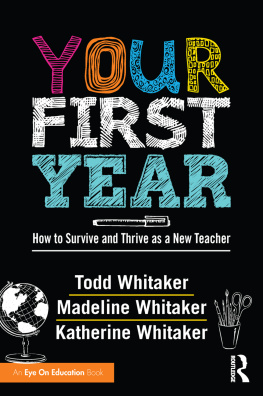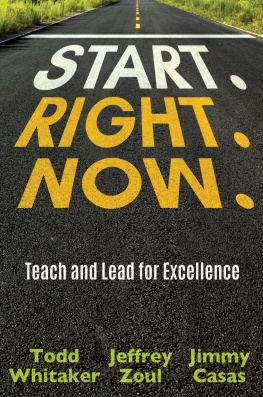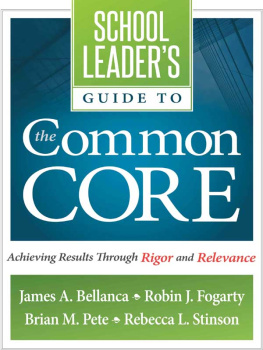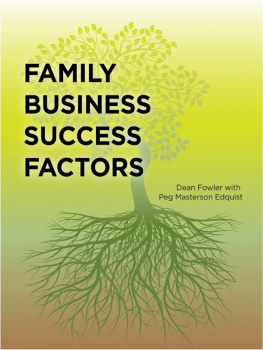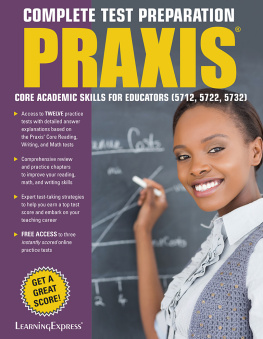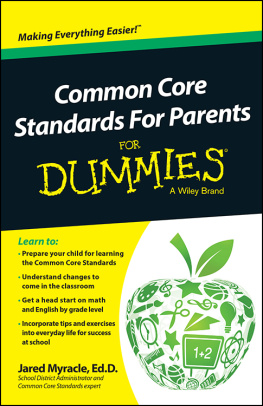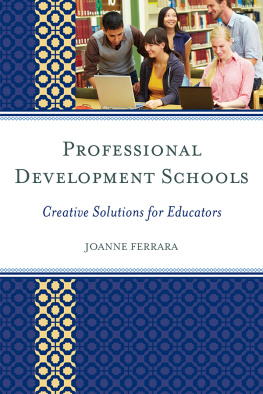Todd Whitaker - The 4 Core Factors for School Success
Here you can read online Todd Whitaker - The 4 Core Factors for School Success full text of the book (entire story) in english for free. Download pdf and epub, get meaning, cover and reviews about this ebook. year: 2008, publisher: Eye On Education, genre: Home and family. Description of the work, (preface) as well as reviews are available. Best literature library LitArk.com created for fans of good reading and offers a wide selection of genres:
Romance novel
Science fiction
Adventure
Detective
Science
History
Home and family
Prose
Art
Politics
Computer
Non-fiction
Religion
Business
Children
Humor
Choose a favorite category and find really read worthwhile books. Enjoy immersion in the world of imagination, feel the emotions of the characters or learn something new for yourself, make an fascinating discovery.

- Book:The 4 Core Factors for School Success
- Author:
- Publisher:Eye On Education
- Genre:
- Year:2008
- Rating:4 / 5
- Favourites:Add to favourites
- Your mark:
- 80
- 1
- 2
- 3
- 4
- 5
The 4 Core Factors for School Success: summary, description and annotation
We offer to read an annotation, description, summary or preface (depends on what the author of the book "The 4 Core Factors for School Success" wrote himself). If you haven't found the necessary information about the book — write in the comments, we will try to find it.
This book clarifies the core values which all great educators have in common and contribute to school success. For all those who want to create better schools, these factors are at the center of behaviors which lead to results. The 4 CORE Factors are Communication, Observation, Relationships, and Expectations.
The 4 Core Factors for School Success — read online for free the complete book (whole text) full work
Below is the text of the book, divided by pages. System saving the place of the last page read, allows you to conveniently read the book "The 4 Core Factors for School Success" online for free, without having to search again every time where you left off. Put a bookmark, and you can go to the page where you finished reading at any time.
Font size:
Interval:
Bookmark:
Also Available from Eye On Education
What Great Principals Do Differently:
15 Things That Matter Most
Todd Whitaker
Study Guide: What Great Principals Do Differently
Beth Whitaker, Todd Whitaker, and Jeffrey Zoul
What Great Teachers Do Differently:
14 Things That Matter Most
Todd Whitaker
Study Guide: What Great Teachers Do Differently
Beth Whitaker and Todd Whitaker
Seven Simple Secrets:
What the BEST Teachers Know and Do!
Annette Breaux and Todd Whitaker
Dealing with Difficult Teachers, Second Edition
Todd Whitaker
Improving Your School One Week At a Time:
Building the Foundation for Professional Teaching
and Learning
Jeffrey Zoul
Cornerstones of Strong Schools:
Practices for Purposeful Leadership
Jeffrey Zoul and Laura Link
What Great Principals Do DifferentlyDVD
Featuring Todd Whitaker
What Great Teachers Do DifferentlyDVD
Featuring Todd Whitaker
Dr. Todd Whitaker is Professor of Educational Leadership at Indiana State University in Terre Haute, Indiana. Prior to coming to Indiana, he was a middle school and high school principal in Missouri. A former math and business teacher at the Junior High level, Dr. Whitaker also served as middle school coordinator in Jefferson City, Missouri. Dr. Whitaker is the author of numerous books, including the highly-acclaimed What Great Teachers Do Differently, Dealing With Difficult Parents, and What Great Principals Do Differently. Dr. Whitaker is a highly sought-after speaker who has made over 1,000 presentations at the state, national, and international levels. He is married to Beth, a former teacher and principal, who is an associate professor in the Elementary Education Department at Indiana State University. They are the parents of Katherine, Madeline, and Harrison.
Dr. Jeff Zoul is a principal with North Shore School District 112 in Highland Park, Illinois. Prior to becoming principal at Edgewood Middle School, Dr. Zoul served as a teacher, coach, assistant principal, and principal at the elementary, middle, and high school levels in the State of Georgia for 26 years. In addition, Dr. Zoul served as an adjunct professor of graduate studies at North Georgia College and State University. He is the author of Improving Your School One Week at a Time: Building the Foundation for Professional Teaching and Learning and coauthor of Cornerstones of Strong Schools: Practices for Purposeful Leadership and Study Guide: What Great Principals Do Differently: 15 Things that Matter Most. Dr. Zoul has presented at national conferences on a wide variety of educational issues. He earned his doctoral degree from the University of Alabama and holds additional degrees from The University of Massachusetts at Amherst, Troy State University, and The University of Southern Mississippi. Jeff is married to Jill, a middle school teacher, and they are the parents of Jordyn. Please contact Jeff at .
If you would like information about inviting the authors to speak to your group, please contact Todd at or (847) 432-3858, ext. 209.
Many years ago, Thomas Jefferson wisely proclaimed: In matters of style, swim with the current; in matters of principle, stand like a rock. This advice still rings true today, particularly for those in the field of education, whereat timesit seems as if matters of style threaten to interfere with sound educational principles. Together, we have amassed over 50 years of experience at all levels of the educational spectrum. In these years, we have seen many matters of style ushered into schools with a great deal of fanfare only to give way in a year or two to another new fad. Although we have accepted many of these changes in style over the years, adapting our practice however slightly to do so, we have held fast to our core beliefs and principles throughout. Early in our careers, each of us realized that educational programs would come and go. Some of these programs seemed fairly effective while others seemed less successful. Secretly, we always suspected that the variable in terms of program success was not so much the program itself as the person charged with implementing the program. This observation led to Todds oft-quoted comment that its people, not programs that make a difference (Whitaker, 2004, p. 9). Although these programs tended to change frequently, the peopleprimarily teachers and principalsrequired to implement them typically remained on the job, adjusting on an annualand seemingly cyclicalbasis to the latest program initiative. Although ushering in a steady stream of such changes proved frustrating, we were both able to swim with the current on those occasions. Part of our success in doing so is that we were steadfast in adhering to our core principles, relentlessly reminding ourselves what was really important in spite of whatever changes might have been occurring around us.
In earlier books, Todd (Whitaker, 2003 & 2004) wrote about the importance of every teacher and principal clarifying their own core values. This is essential for the success of any educator, particularly in todays public school setting, where so much of what we do seems to be in a constant state of flux. In order to not only survive, but thrive, as an educator truly focused on what is most important, we must rely on our core principles to see us through the shifting currents of style. We realize that every teacher and school administrator reading this book is a unique individual, working in a unique school setting, with a wide variety of diverse challenges and rewards. Each of us is faced with a litany of choices on a daily basis. Our educational principles are what guide us when faced with an onslaught of what could otherwise prove an overwhelming number of challenges and tough decisions. Whether you are a teacher or an administrator working at the elementary, middle, or high school level, in an urban setting, or in a small rural school, you are faced with monumental tasks each and every day, and we encourage you again to reflect on and clarify what lies at the core of your educational philosophy. What is it that comprises the very essence of you as an educator? We maintain that although great educators vary in numerous ways, there are a few core principles that they all have in common and that contribute to overall school success.
In addition to creating a list of core principles on which we stand to guide us through times of change and conflict, we must also share these openly and regularly with others. Teachers must share these with their students, with their parents, with their teaching colleagues, and with their administrators. Administrators must also share their core principles with everyone in the school community, particularly every teacher (a term we use to include all adults at the school who come in contact withand, therefore, teachstudents; cafeteria workers, custodians, and secretaries teach our students wonderful lessons every day) working within the school. Although we have written and presented on a wide variety of topics in recent years, we learnedwhile collaborating on a previous projectthat we share four particular core principles in common. In working with thousands of teachers and school leaders across the country, we came to realize that the very best among them also emphasized these principles in their classrooms and throughout their schools. We began discussing the importance each held for us, how each of the four had played a major role in any successful ventures in which we had participated, and how one or more of these principles had been overlooked in less successful initiatives. These discussions became the genesis for the ideas contained in this book. As we kept returning to the theme of clarifying those core principles we held in common, we also realized that they coincided nicely with the very word core itself, and we introduced the acronym C.O.R.E. to stand for our four most important and enduring principles of success for both teachers and school leaders: Communication, Observation, Relationships, and Expectations (Zoul & Link, 2007). We consider each of these four factors relating to all levels of education matters of principle, and we continue to stand, as Jefferson advised, like rocks in ensuring that we purposefully act in ways that emphasize our beliefs related to these simpleyet powerfulprinciples.
Next pageFont size:
Interval:
Bookmark:
Similar books «The 4 Core Factors for School Success»
Look at similar books to The 4 Core Factors for School Success. We have selected literature similar in name and meaning in the hope of providing readers with more options to find new, interesting, not yet read works.
Discussion, reviews of the book The 4 Core Factors for School Success and just readers' own opinions. Leave your comments, write what you think about the work, its meaning or the main characters. Specify what exactly you liked and what you didn't like, and why you think so.

